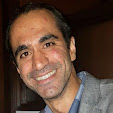By Seraj Assi
July 1995. A small Palestinian village
in Israel.
It was a Friday prayer. The imam took
to the pulpit, and announced, with a sad face and tearful eyes, that thousands
of fellow Muslims had been massacred somewhere in Bosnia.
That day, the local newspaper, an
Arabic weekly named the Voice of Justice and Freedom, published
horrific photos on its front page under the headline: Genocide against Muslims.
I was fourteen when
the Srebrenica massacre unfolded, and I remember it all in vivid detail.
People in the village erupted in
anger. They put together homemade protest signs, and marched in the streets in
the hundreds. People donated blood and money to our Muslim brothers in Bosnia.
Women parted with their jewelry. Families registered to adopt newly orphaned
Bosnian children. It was a genuine outrage, and quite surprising, considering
how far Bosnia was.
It was an amazing spectacle of
brotherly solidarity, or what historian Benedict Anderson terms “imagined
community.” A surviving photo shows me parading alongside my father. The signs
behind us read: “Stop war crimes in Bosnia.” “Muslims in genocide camps.” “From
the hell of war to the hell of genocide.”
Three decades on, history would repeat
itself in Gaza, but not in our village.
Since the genocide in Gaza unfolded,
my father has stayed home. Despite his deep Palestinian roots, and while the
genocide in Gaza has reaped three times more victims in Gaza than it did in
Bosnia, my Palestinian father, like many Palestinians inside Israel, has
remained silent on Gaza.
My father is not numb to Palestinian
suffering. He harbors great sympathy for his Palestinian brothers across the
border. But he is simply afraid to speak up. And for a fairly good reason.
Since October 7, Israel has imposed a
sort of martial law on its Palestinian citizens, banning any form of solidarity
or sympathy with fellow Palestinians in Gaza. The Israeli police have cracked
down on any peaceful protest against the war in Gaza. Under the pretext of
fighting terrorism, the state put in place a new law that threatens to strip
Palestinians of their citizenship and residency over solidarity with Gaza.
This was the greatest existential
threat made by Israel against its Palestinian citizens in decades: To those
Palestinians, losing their Israeli citizenship amounts to a second Nakba.
In the span of ten weeks, Israel has
turned itself into a policy state, an increasingly authoritarian state
masquerading as a democracy. It has put in place a series of new emergency laws
specifically targeting its Palestinian citizens. A Likud minister formulated
emergency regulations to imprison citizens who “harm national morale” and
“undermines the morale of Israel’s soldiers and residents in the face of the
enemy,” allowing the Israeli police to arrest, expel, and seize the property of
civilians opposing the war or showing solidarity with Gaza. The head of the
Israeli police declared a “zero tolerance” policy for anti-war protestors,
threatening to “send them to Gaza.” Communications Minister Shlomo Karhi brought to the Knesset a
new legislation that would give him the authority to take broadcasts off air
and confiscate broadcasting equipment suspected of damaging national security
or public order, or contributing to “enemy propaganda.”
As a result, a culture of ethnic
intimidation, harassment, and surveillance has been brewing inside Israel.
Embarking on a state-wide censorship and suppression, the Israeli police have
relentlessly targeted and persecuted Palestinian citizens in the name of
national security. Hundreds have been arrested for “incitement and support for
terrorism.” These include teachers, artists, students, activists, and
politicians. Alarmed by the rise of ethnic violence, Arab civil society
organizations in Israel have established a joint emergency network to respond
to threats, especially in mixed cities and on campuses.
Anti-Palestinian McCarthyism is not
new in Israel. Adalah, the Legal Center for Arab Minority Rights in Israel,
counts more than sixty basic laws that clearly disenfranchise and discriminate
against Palestinian citizens. These include the Jewish Nation-State Law, which
enshrines Israel as the “national nation-state of the Jewish people only,” and
officially designates Arab Palestinians, who constitute more than 20 percent of
the population, second-class citizens. Israel also has a “Nakba Law,” which bans
the commemoration of the Nakba by Palestinian citizens.
The unprecedented crackdown on
Palestinian citizens has been years in the making. For decades, senior Israeli
politicians have portrayed Palestinian citizens as enemies from within, a
demographic time bomb, a fifth-column population. Ethnic transfer plans
abounded. The so-called Lieberman Plan, hatched by former foreign minister
Avigdor Lieberman, proposed exchanging land populated by Palestinian
citizens for Israeli settlements in the West Bank. Senior Israel politicians,
including Lieberman and Benjamin Netanyahu, have on several occasions proposed
imposing loyalty tests for the Palestinian minority, threatening to deny
citizenship to those who failed.
The prospect of disenfranchisement and
ethnic transfer has a deep psychological effect on Palestinian citizens like my
father, who would rather stay silent than risk expulsion.
But their fears run even deeper and
have a long and deep-seated history of oppression. For many of those
Palestinians, the current political climate brings back the ghosts of the
Military Government period (1948–1966), a regime of martial law imposed by
Israel on its Palestinian citizens after the Nakba, which, among other things,
suspended most of their civil rights and legal protections, including freedom
of movement, speech, press, and association.
My father thus belongs to a second
generation of Palestinians in Israel who were raised in the shadow of the
military regime, and who remain haunted by the ghosts of the Nakba.
Nearly three decades ago, my
Palestinian father marched against the Bosnian genocide. Now he is afraid to
march for his own people in Gaza. His story embodies the political predicament
and tragic irony of being a Palestinian in Israel today.


